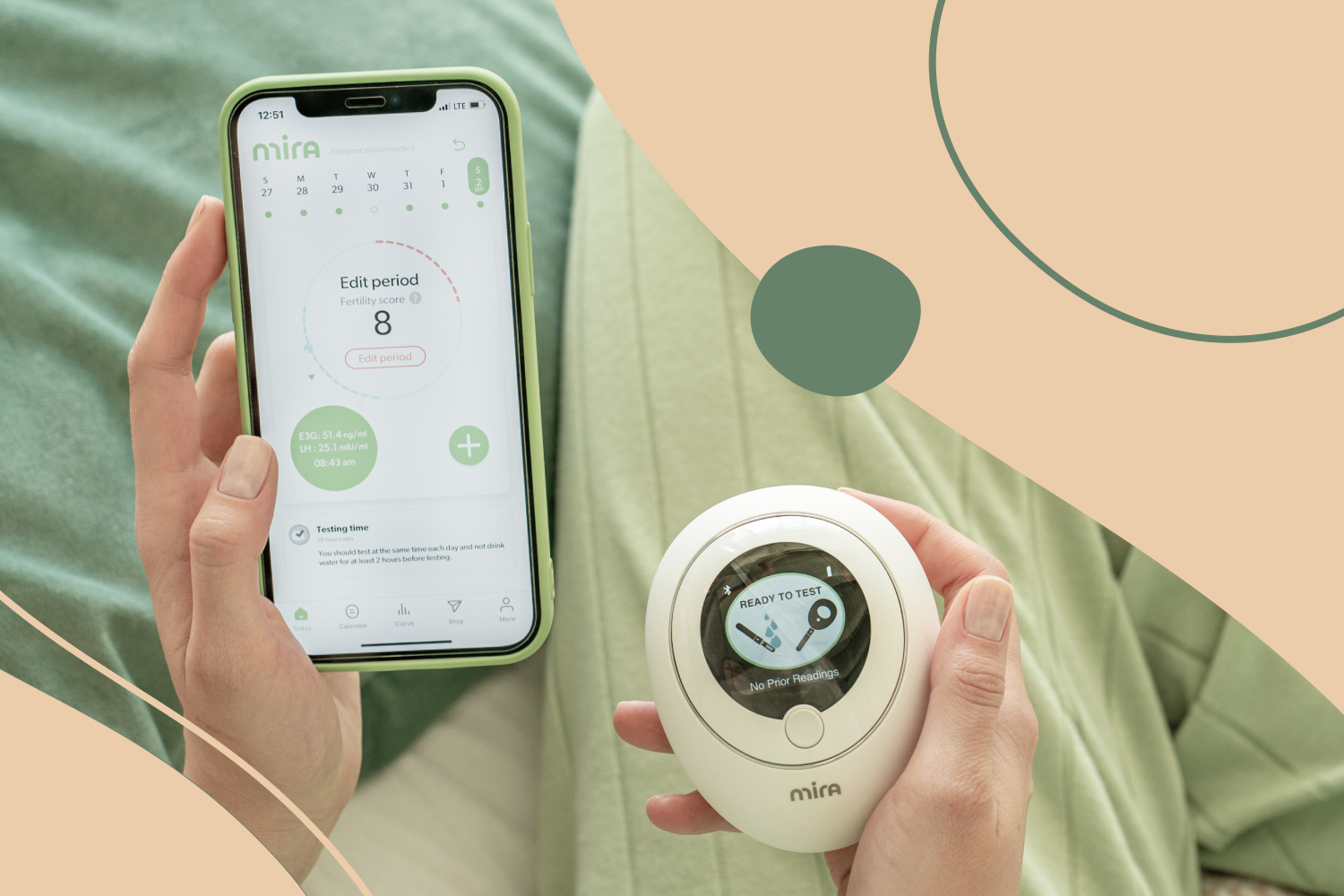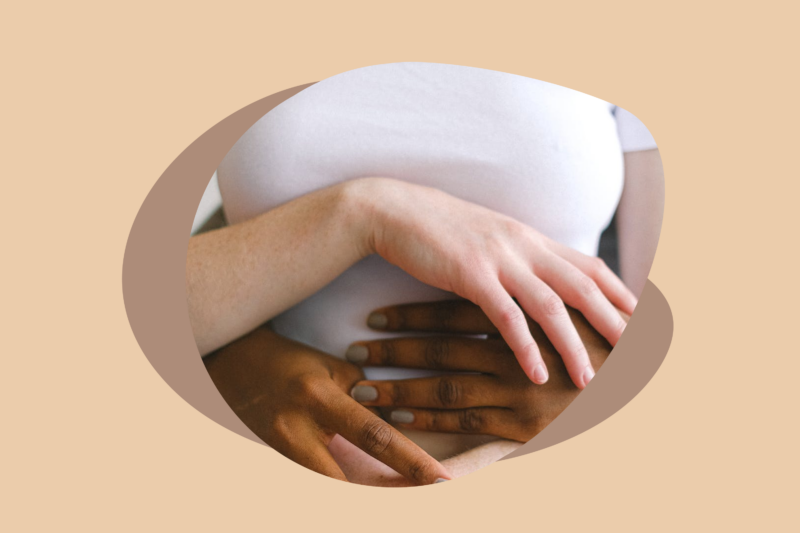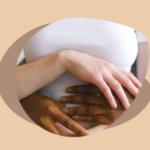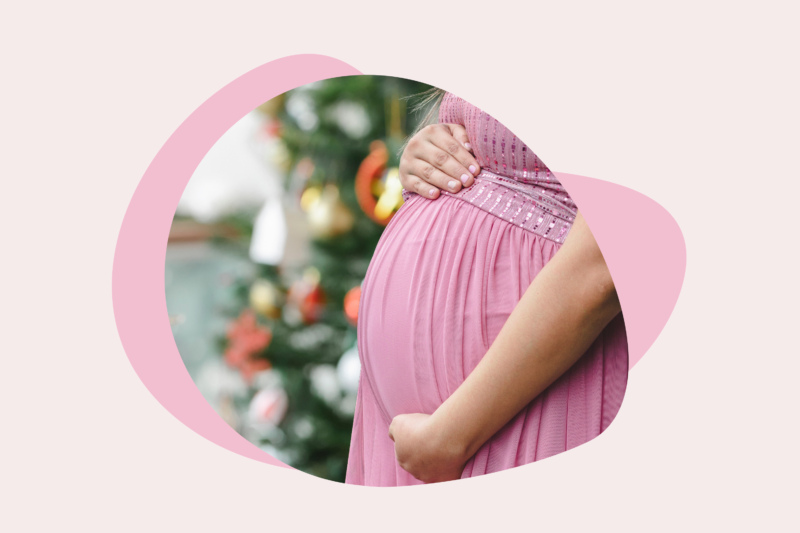Pregnancy after miscarriage
The loss of a pregnancy can be physically and emotionally challenging, but it should not stop you from trying again when you are ready. The good news is that most miscarriages are a once-off incident and the only real factor that prevents pregnancy after miscarriage is when ovulation returns. This blog post will help you know what to expect from your body as you recover from a miscarriage, when ovulation after miscarriage is possible, and what to look for if you’re TTC.

Key Takeaways
- Approximately 15 to 20 percent of pregnancies will end in miscarriage but in the majority of cases nothing could have been done to prevent it.
- It can take weeks to recover both physically and emotionally from miscarriage but it’s important that you feel ready before trying again.
- There are known risk factors for miscarriage (like smoking, alcohol, and caffeine) so lead a life as healthy as possible before conception and control your caffeine intake (especially if you’re pregnant).
What causes miscarriage?
There are a number of reasons that a miscarriage may occur. Sometimes, it can be narrowed down to a certain factor, like genetic abnormalities, but many times there is no specific cause or reason for the spontaneous end of a pregnancy. The American College of Obstetricians and Gynecologists states that approximately 15 to 20 percent of pregnancies will end in miscarriage and it is more common than you think.
Chromosomal mismatches and genetic abnormalities are one of the most common reasons for miscarriage. Although we’re not always clear on why they occur, issues like this mean the fetus would not be able to develop normally, often resulting in miscarriage. Maternal health conditions can also play a role in the healthy development of a pregnancy. Hormonal problems, issues with the cervix, obesity, and even thyroid disease might lead to miscarriage.
You are more at risk of having a miscarriage if you engage in certain lifestyle activities as well. Your weight, habits (ie. smoking, drinking, etc), and age can all add to your risk of miscarriage. Of course genetic conditions could also play a role here too and one or both partners may be at an increased odds of miscarriage.
What are the odds of another miscarriage?
There is no evidence to suggest that having a miscarriage will affect your fertility in the long term but that comes with a disclaimer. Research has found that your chances of experiencing another miscarriage increases with each consecutive miscarriage. After an initial miscarriage, the risk of a subsequent miscarriage is 20%. Beyond that, the risk increases to 28% and 43% after two and three consecutive miscarriages, respectively.
It’s important to note that you can influence these odds by getting regular prenatal care, taking your vitamins, limiting caffeine, and avoiding risk factors like smoking, drinking, or illegal drug use. It’s also important to bear in mind that even though your chances of experiencing another miscarriage increase, an estimated 75% of women still go on to have successful pregnancies following two or more miscarriages.
Preparing for Pregnancy After Miscarriage
Emotional and Physical Readiness
It can take weeks to months for your body to physically recover from a miscarriage. Most people get their period again four to six weeks after. If you are TTC, you can start trying in the first cycle after a pregnancy loss or after your period has returned. You should discuss with your doctor whether you are physically cleared to start trying again or if you should hold off. You may need to wait longer if you’re undergoing further testing or scans to determine why you miscarried.
Having a miscarriage is a heavy event and you can expect to experience a wide range of strong emotions. Finding a solid support system can help you recover physically and emotionally, which can help you prepare for trying to conceive your next time around.
Health and Lifestyle Adjustments
Most doctors recommend waiting a few months to allow you to recover physically and emotionally after having a miscarriage. You may undergo testing to determine the cause of your miscarriage or address any underlying health issues. Medical tests and examinations may include blood tests, pelvic exams, ultrasound, tissue tests, and chromosomal testing. Each individual situation is different and the best way to navigate pregnancy after a miscarriage is under the guidance of an OBGYN who knows your full medical history.
There are a number of different at-home tests you can try as well – including Mira’s own Fertility Panorama Lab Test. You can gain a better perspective on your reproductive health through a single, at-home lab test. It tests 5 hormones (AMH, TSH, fT4, Prolactin, and Free Testosterone) that affect your ovulation, cycle regularity, and ability to get pregnant. You get 5 individual and personalized hormone reports with actionable steps to help you understand what your numbers mean for ovarian reserve, thyroid function, menstrual cycle, hormonal balance, and fertility health. Hormone testing won’t guarantee a successful pregnancy but it can help to shed light on your ability to get pregnant and overall reproductive health.
In addition to hormone testing, we know there are lifestyle factors that affect fertility so working to address these can do wonders for your reproductive health. Maintaining a healthy weight, eating a healthy diet, getting enough sleep, and keeping stress levels under control can all go a long way in preparing your body for pregnancy. Do your best to lead a healthy lifestyle, including exercise and staying away from anything harmful, and make sure to take your prenatal vitamins. Try not to stress out too much about a previous miscarriage, as it has nothing to do with your ability to have a healthy baby. Only 2% of women will have two miscarriages in a row and most women go on to have normal pregnancies after miscarriage, especially if they are younger than age 35.
Looking for more personalized support? Fertility coaching is a structured form of support for individuals who are interested in conception, actively trying to conceive (TTC), and/or struggling to balance their sex hormones. Unlike a doctor who can diagnose, treat, or provide medical advice, a fertility coach offers practical and holistic guidance on all things fertility. Mira’s own virtual fertility coaches can help you navigate your path to parenthood and have first-hand experience with the Mira App and Monitor to help clients understand and interpret their data.
Getting Pregnant after Miscarriage
Conception Strategies
Many doctors recommend waiting three to six months before trying to conceive again after a miscarriage. But do you really have to wait that long? The answer is usually no.
One recent study has actually shown that a very short interpregnancy interval of fewer than three months has no detrimental effects on pregnancy outcomes. There is no difference in terms of live birth rates, rates of miscarriage, or rates of pregnancy complications between women who get pregnant sooner than three months and women who get pregnant three or more months after miscarriage.
Another study actually showed that women who conceive earlier after a miscarriage may have better outcomes and fewer complications.
When you are emotionally and physically ready to try to conceive after a miscarriage, you will want to be aware of your body’s hormonal fluctuations, fertile window, and day of ovulation. Knowing this information enables you and your partner to plan sex at the times when you have the greatest chance of getting pregnant.
In order to know when your body is ovulating after a miscarriage, there are a few signs to be aware of like a surge in luteinizing hormone (LH), changes in basal body temperature, as well as other symptoms like pain or cramping.
Luteinizing hormone, or LH, is the fertility hormone that directly regulates ovulation and LH levels peak about 10-12 hours before you ovulate. LH levels should remain low for the rest of the menstrual cycle unless you have a condition like polycystic ovarian syndrome (PCOS) that affects your hormones. LH can be tested using ovulation prediction kits (OPKs) or with hormone tracking systems like Mira.

Right before ovulation, your basal body temperature will drop slightly and then increases shortly after ovulation. Many women record their temperature daily in order to spot this sudden drop in temperature before ovulation in order to know when they are the most likely to conceive. This is known as the Basal Body Temperature (BBT) method. This method requires a specialized thermometer to help you monitor and chart your temperature. This information is then used to help predict and confirm ovulation.
It is common for some women to experience pain in their lower abdomen when they ovulate. This is often referred to as “mittelschmerz” or “middle pain” in German, and it is caused by the processes behind ovulation.
It typically starts around two weeks before your period, and it may occur on either the left or right side of your lower abdomen, depending on which ovary is releasing an egg. How long the pain lasts varies among women, with some experiencing ovulation pain for only a few minutes, while others may experience it for a few days.
Other common symptoms of ovulation include changes in cervical mucus, changes in the positioning and texture of the cervix, and increased libido. Additionally, some people may also experience light spotting, cramping, bloating, and breast tenderness.
Once ovulation has returned, it’s a good idea to start taking a daily prenatal vitamin and following a healthy lifestyle. This will ensure that your body has enough nutrients to support early fetal development while also reducing the risk of birth defects.
Managing Anxiety and Setting Realistic Expectations
If you find yourself experiencing anxiety or depression after your miscarriage, know that these feelings are natural. Losing a baby is emotionally challenging, and there is no shame in having had a miscarriage. You may consider talking to a therapist or psychologist about the way you are feeling to reduce stress and anxiety prior to getting pregnant again.
You will be relieved to know that having a miscarriage does not negatively impact your chances of conceiving successfully. Miscarriages are incredibly common, resulting from 1 in 4 confirmed pregnancies, and while they are difficult to go through, most women can go on to have a healthy pregnancy afterward.
You should know that you’re less likely to have another miscarriage if you are under age 35, as fertility drastically declines after age 35. It’s also important to recognize that there is a difference between having a single miscarriage and having two or more when it comes to the effects of miscarriages on your fertility.

A little extra support from an expert can go a long way
Book an online consultation with one of our Hormone Health Coaches.
Schedule NowThe risk of miscarriage increases with the number of consecutive miscarriages. After one miscarriage, your risk of a second consecutive miscarriage is 20%. After two consecutive miscarriages, the risk increases to 28% — and after three consecutive miscarriages, the risk is 43%.
While these statistics may seem disheartening, it does mean that most women who have one or more miscarriages can still go on to have a healthy pregnancy. Talk to your OB/GYN if you are especially concerned about your odds of getting pregnant after your miscarriage, but know that you most likely have nothing to worry about.
The thought of pregnancy, especially after miscarriage, can sometimes feel a bit intimidating. A fertility coach can help answer all of your questions about the process of getting pregnant – including how long (on average) it may take, what to expect, how to plan sex around your fertile window, and what lifestyle changes you may need to make in order to maximize your chances of success.
A quick google search will tell you there are thousands of fertility coaches to choose from. Mira has its own virtual fertility coaching service where you can easily book online sessions.
Conclusion: Embracing Hope and Health
Pregnancy loss can be challenging for anyone to experience. Even though the loss can be devastating, most people go on to have a successful pregnancy. Give yourself plenty of time to recover and grieve and wait until you feel emotionally and physically ready. Allowing yourself this time will put you in a much more stable and healthy position to try again in the future.
Finding and seeking support during these times can make all the difference. Whether that’s talking to a trusted friend or someone you know who has gone through something similar, or speaking to a professional it’s important to find a solid support system. They can help you recover physically and emotionally, which can help you prepare for trying to conceive your next time around.
FAQs about getting pregnant after a miscarriage
How long after a miscarriage can you get pregnant?
It is possible to get pregnant after a miscarriage as soon as you begin ovulating again. This may take a few weeks, or it may take months. It’s important to wait until you feel ready, both emotionally and physically before you try again.
How long after a miscarriage can you have sex?
Doctors recommend waiting at least two weeks after miscarriage before any penetration of the vagina, including sex. During this time your cervix is wider than normal to allow the body to clear the uterus, making it more prone to infection (hence the wait).
No period after miscarriage could I be pregnant?
Your cycle after a miscarriage could be quite different from what you’re used to. It can take some weeks to return and may look different from your typical menstruation. If your cycle hasn’t returned within six weeks, you could be pregnant and it’s best to speak to your doctor.
Mira’s Editorial Process
All content produced by Mira meets stringent editorial standards, ensuring excellence and accuracy in language and medical precision. Every piece undergoes thorough fact-checking and review by qualified professionals. Check out our full editorial process to learn more.










